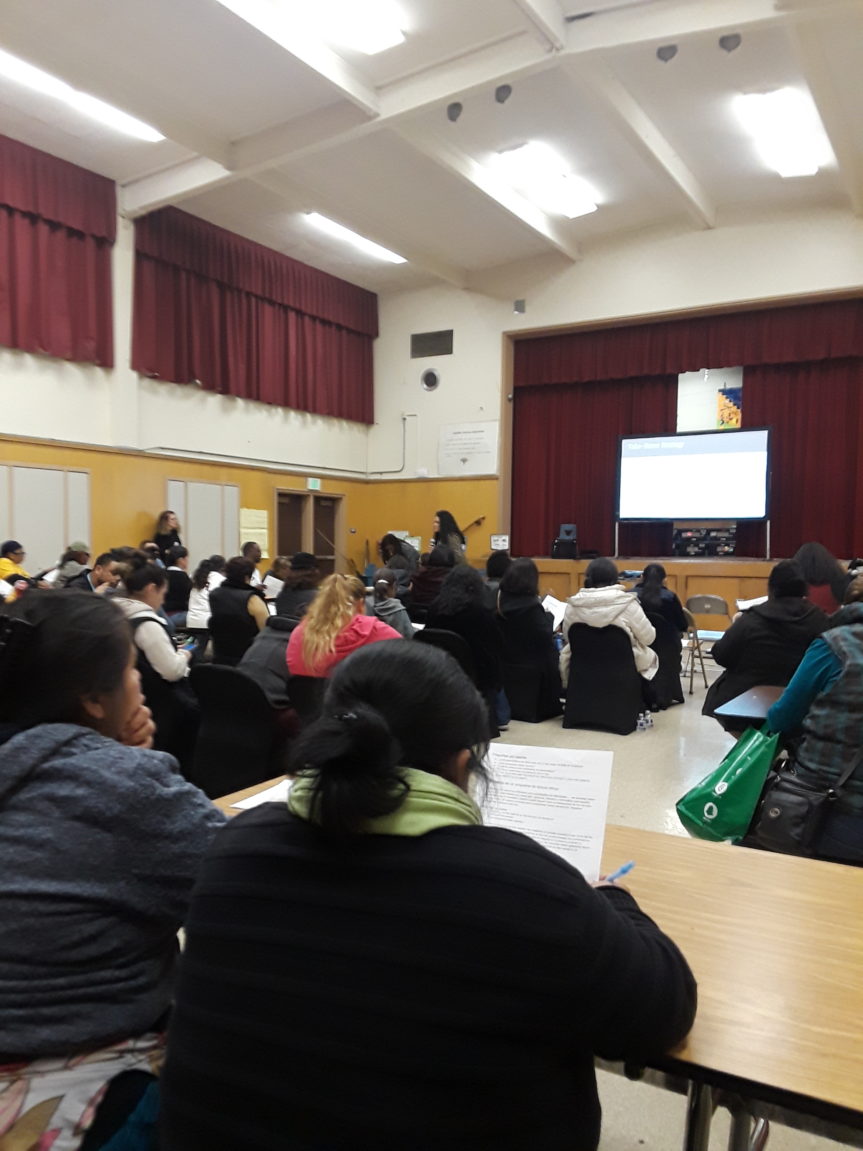How well can your child read? Not what are their grades, but really, how well can they read? Are they on grade level? That was a question The Oakland REACH and Oakland NAACP started asking with families over the last year, and as the answers emerged, a new campaign was born, the Oakland Literacy For All. Last night was the first of several coalition trainings for families and it was powerful.
A packed room at Madison Park Elementary talked through not only the challenges we face. Roughly 18% of Black and 24% of Latinx youth are reading at grade level in OUSD (and it’s not much different in the public charters). And many schools and teachers (both district and charter) aren’t properly assessing and supporting students. In many cases because educators themselves don’t have access to appropriate materials, training or professional development.
It was one of those authentic nights in Oakland, families of every stripe coming out for their kids. Grassroots organizations listening to families and bringing partners in to support, and folks leaving out with more than they came in with—in a very practical way.
A room full of public school parents, district and charter, OUSD brass, Lakisha Young from The Oakland REACH, Kareem Weaver from the Oakland NAACP, and Dana Cilono from SEEDS of Learning all coming together for a common need—literacy—it was powerful. There are many common goals we need to work on, and reading should top that list.
“With numbers like that everything has to be on the table”
Kareem Weaver, from the NAACP Education Committee intoned, “with numbers like that everything has to be on the table.” And “we hear the same excuses, poverty, trauma, that something is wrong with your child because they can’t read—rather than, we didn’t teach her.”
Weaver broke it down in a powerful presentation (you gotta check the slides out as you listen to the audio) he starts in at 6:30 in the video, you can it here. (Apologies for the incompetent cameraperson.)
He runs through, the data, the reasons we hear why kids can’t read, and the actual research about learning to read. All of our kids can learn to read, if taught correctly.
Let me repeat. All of our kids can learn to read, if taught correctly.
Dyslexics Are Over Represented as Millionaires and Inmates- Reading Matters
He dug in particularly on dyslexics, and the geniuses we know, that have that that have this specific learning difference—Steve Jobs, Picasso, Bill Gates, Da Vinci and Thomas Jefferson among many others. So those kids can be in the back of the class or front of the world, and it depends on how they are taught. Dyslexics make up roughly 20% of the population and 43% of the self-made millionaires, and 60-80% of folks in prison are dyslexic. So, it can go two ways, and it is up to us. We can unlock genius or lock cell doors.
Then he spoke directly to parents. With specific questions and strategies to hold schools and teachers accountable for their teaching of literacy and support of students. Families brought their real-life concerns, and there was a real community dialogue. Not the pre-packaged speeches you hear at board meetings, from folks who tend to not have kids in the Flats. These were the grassroots parents of Oakland, with real concerns, and lived experiences, that needed to be heard.
“That’s Our Job”
I really appreciated the principal from Madison Park Primary as well. A school Weaver identified as making strong progress in literacy. We often blame ourselves and each other when our kids can’t read. Yes, we want families to be involved. But not all families can be, or are, and children should not bear the burdens of their families in any event. Principal Moore, spoke up when one of these common refrains surfaced.
“My job as an educator is to make sure no matter how you show up, that you get it… that you learn what you need each year to be successful.” We need more educators, charter and district with that drive.
SEEDS of Literacy and What Kids Need to Read
Next was Dana Cilono from SEEDs of Learning digging in with parents on what they should understand about effective reading instruction and what parents can do, you can see the video of her here. Families reflected on their own experiences and worked practically through the challenges that students have in reading, and how parents can understand and support their child.
I have written before about the powerful work SEEDS is doing, with real parent empowerment. And this was another example of them out in the community with real parents working on the issues parents identified.
An Encouraging Night for Oakland
The public debate in Oakland usually has nothing to with what the average Flatland parent needs. And with all the rancor and fighting, it feels like we tend to go nowhere arguing about nothing. This was different. We have a literacy crisis in Oakland and the answers are not going to come from the top but the families and community. So, much love, to all the families that came out, the Oakland NAACP, The Oakland REACH, SEEDS of Learning and everyone else who supported.
We can and need to change these numbers but it will take all of us to do it.
Please check out the campaign and see how you can plug in, to either support families or get support.

